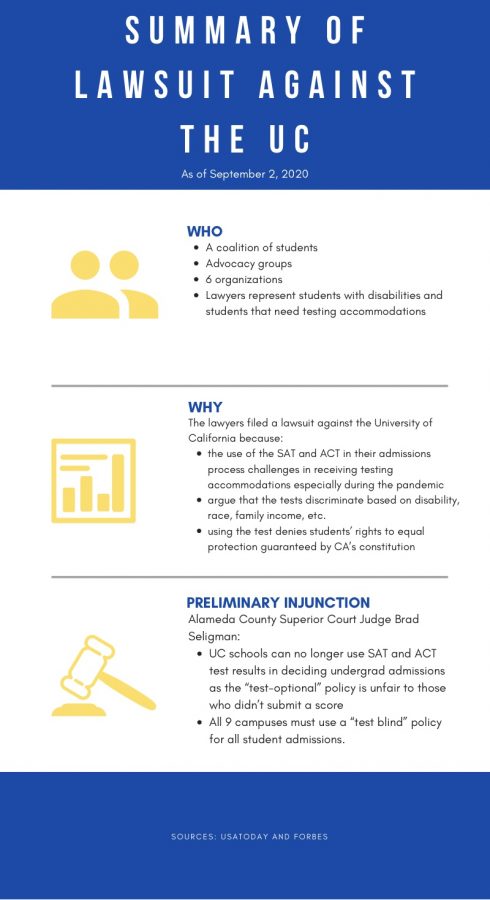Your donation will support the Student Publications Department at Mater Dei High School. Your contribution will allow us to keep our equipment up to date and cover our annual website hosting costs.
UC test blind policy raises questions about test importance in college admissions
October 29, 2020
Cancellations of the SAT and ACT for the spring and summer due to the uprise in COVID-19 cases have led colleges and universities throughout the country to gradually adjust or drop the standardized test requirement for college applications. Most have adopted a test optional policy, meaning that applicants will not penalized for not submitting test scores from the SAT or ACT. However, whether a high school senior is relieved about these policies, the fight to eliminate the standardized tests began before the pandemic hit our country.
In December 2019, a lawsuit was filed against the University of California by student plaintiffs, advocacy groups, and six organizations (including the Compton, California School District) for the use of the SAT and ACT in the admissions process. According to Forbes, lawyers representing students argued that the use of test results discriminated based on race, disability, and family income, and using the test denied students’ right to equal protection guaranteed by California’s constitution.
Then, this past September, Alameda County Superior Court Judge Brad Seligman issued a preliminary injunction that bars the University of California school system from considering SAT or ACT test scores in their admissions review. Though attorneys representing the UC system have assured that not submitting a test score will not place them at a disadvantage, according to USATODAY, Seligman said that “the tests are treated as a plus factor, and thus test submitters are given a second opportunity for admission consideration.” As a result of this new test blind policy, applicants who didn’t submit a test will not get a second consideration, including those who didn’t get the opportunity to take an exam or the needed accommodations to test in the first place.
Although many question the need for standardized tests, counselor Sasha Lo said the exams the SAT and ACT “were meant to be [a] common yardstick…because our high schools across the country have different curriculums.”
“We’re interpreting and comparing by having a standardized test [because] it’s helpful to see the same scale across not just California and our country but internationally too,” she said.
Seniors Alyssa Johnson and Ryan Nguyen said that they have been studying for the SAT with the hopes of taking it soon. Still, they said that standardized tests aren’t a great reflection of a student or their intelligence.
“It does reflect your ability to prep for something, a singular event that’s important, and I think that’s important as well but I think it could also take that out of somebody’s GPA or their AP scores,” Johnson said.
Nguyen states he is relieved about the test blind policy because it means less to worry about since tests were already optional.

The nine UC campuses are to use a “test blind” policy for all student admissions until the case settles or a final ruling is issued. In December 2019, a lawsuit was filed against the University of California by student plaintiffs, advocacy groups, and six organizations for the use of the SAT and ACT in the admissions process. “I think this will be a big push to reexamine, and the results of that might mean a huge shift in the testing [process].” (Canva graphic by Danielle Jones)
“In general, I think colleges underestimate the importance of the SAT and ACT while students overestimate [its] importance,” Nguyen said “It’s a holistic process though, so we should be optimistic that they’ll handle it well.”
In a 2017 survey by the National Association for College Admission Counseling, colleges reported that grades in classes and strength of curriculum ranked higher than SAT and ACT scores in importance for admissions.
“I think there’s more than the test score that should be viewed,” Johnson said. “…we want to have good citizens who contribute to society and I think people who are on the right track and know what they like to do and know what they want to do; that’s important.”
Even in non-pandemic circumstances, testing policies were bound to be adjusted or changed, according to Lo, because the skill sets students now need to succeed include more than just understanding core subjects of English, math, history, and science.
“..now it’s about connection and being able to analyze things and using technology,” Lo said.
Lo advises that students research each institution they’re considering applying to for specific reviewing policies and the reasons for them in their admissions process.
“There are still things changing day to day”, Lo said. “We are a large state and the most populous. We have a lot of students [so] it’s definitely going to have an impact…It is a time to review our processes so that we could understand student performance in college. I think this will be a big push to reexamine [because] the results of that might mean a huge shift in the testing.”
The University of California initially suspended test requirements for applicants through 2024 for the possibility of implicating their own standardized test in the future. As for the lawsuit, all nine UC campuses are to use a “test blind” policy for all student admissions until the case settles or a final ruling is issued, which leaves many students contemplating whether taking the SAT or ACT is even worth it.
“Testing was important but they’re not the only part that admissions look at,” Lo said. “They’re always looking at your classes, activities, essays, who you are and what your goals are…They’re going to continue to do that. So let’s remember that those factors are still ongoing and there’s still many opportunities for us to showcase our talents and skills.”